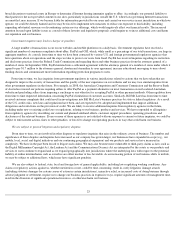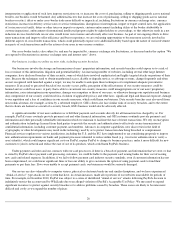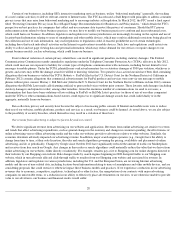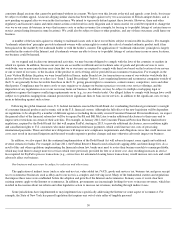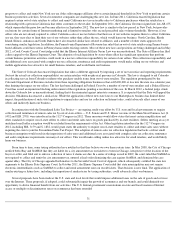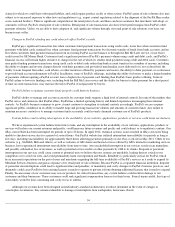eBay 2012 Annual Report Download - page 31
Download and view the complete annual report
Please find page 31 of the 2012 eBay annual report below. You can navigate through the pages in the report by either clicking on the pages listed below, or by using the keyword search tool below to find specific information within the annual report.
Our growth will depend on our ability to develop our brands, and these efforts may be costly.
We believe that continuing to strengthen our brands will be critical to achieving widespread acceptance of our services, and will require a
continued focus on active marketing efforts across all of our brands. We will need to continue to spend substantial amounts of money on, and
devote substantial resources to, advertising, marketing, and other efforts to create and maintain brand loyalty among users. Since 2005, we have
significantly increased the number of brands we are supporting, adding Shopping.com, our classified websites (including Den Blå Avis,
BilBasen, eBay Classifieds (including eBay Anuncios, eBay Kleinanzeigen and eBay Annunci), Gumtree, Kijiji, LoQUo, Marktplaats.nl,
mobile.de and alaMaula), StubHub, Bill Me Later, Gmarket, Milo, WHERE, RedLaser, Zong and GSI, among others. Each of these brands
requires its own resources, increasing the costs of our branding efforts. Brand promotion activities may not yield increased revenues, and even if
they do, any increased revenues may not offset the expenses incurred in building our brands. Also, major search engine operators that we use to
advertise our brands have frequently changing rules that govern the pricing, availability and placement of online advertisements (e.g., paid
search, keywords), and changes to these rules could require us to increase our spending on online advertisements and adversely affect our ability
to use online advertising to promote our brands in a cost-effective manner. If we fail to promote and maintain our brands, or if we incur
substantial expenses in an unsuccessful attempt to promote and maintain our brands, our business would be harmed.
New and existing regulations could harm our business.
We are subject to the same foreign and domestic laws as other companies conducting business on and off the Internet. It is not always clear
how existing laws governing issues such as property ownership, copyrights, trademarks and other intellectual property issues, parallel imports
and distribution controls, consumer protection, taxation, libel and defamation, obscenity and personal privacy apply to online businesses such as
ours. Many of these laws were adopted prior to the advent of the Internet and related technologies and, as a result, do not contemplate or address
the unique issues of the Internet and related technologies. Those laws that do reference the Internet, such as the U.S. Digital Millennium
Copyright Act, the U.S. “CAN-SPAM” Act and the European Union's Distance Selling Directive (which will be superseded by the new
Consumer Rights Directive, which the member states are in the process of implementing) and Electronic Commerce Directive are being
interpreted by the courts, but their applicability and scope remain uncertain. As our activities, the types of goods and services listed on our
websites, the products and services we offer (including through acquisitions such as Bill Me Later and StubHub) and our geographical scope
continue to expand, regulatory agencies or courts may claim or hold that we or our users are subject to additional requirements (including
licensure) or prohibited from conducting our business in their jurisdiction, either generally or with respect to certain actions (e.g., the sale of real
estate, event tickets, cultural goods, boats and automobiles, or the application of distance selling laws). Recent financial and political events may
increase the level of regulatory scrutiny on large companies in general, and financial services companies in particular, and regulatory agencies
may view matters or interpret laws and regulations differently than they have in the past and in a manner adverse to our businesses.
Our success and increased visibility has driven some existing businesses that perceive our business models to be a threat to their businesses
to raise concerns about our business models to policymakers and regulators. These established businesses and their trade association groups
employ significant resources in their efforts to shape the legal and regulatory regimes in countries where we have significant operations. They
may employ these resources in an effort to change the legal and regulatory regimes in ways intended to reduce the effectiveness of our
businesses and the ability of users to use our products and services. In particular, these established businesses have raised concerns relating to
pricing, parallel imports, professional seller obligations, selective distribution networks, stolen goods, copyrights, trademarks and other
intellectual property rights and the liability of the provider of an Internet marketplace for the conduct of its users related to those and other
issues. Any changes to the legal or regulatory regimes in a manner that would increase our liability for third-party listings could negatively
impact our business.
Over the last few years, some large retailers and their trade associations have sought legislation in a number of states and the U.S.
Congress that would make eBay liable for the sale of stolen property or would ban certain categories of goods from sale on our platform,
including gift cards and health and beauty products. While no such legislation has passed to date, the proponents continue to seek passage of
such legislation, and if any of these laws are adopted they could harm our business.
Numerous states and foreign jurisdictions, including the State of California, where our headquarters are located, have regulations regarding
“auctions” and the handling of property by “secondhand dealers” or “pawnbrokers.”
Several states and some foreign jurisdictions have attempted
to impose such regulations upon us or our users, and others may attempt to do so in the future. Attempted enforcement of these laws against
some of our users appears to be increasing. In France, we have been sued by Conseil des Ventes, the French auction regulatory authority, which
has alleged that sales on our French website
29






